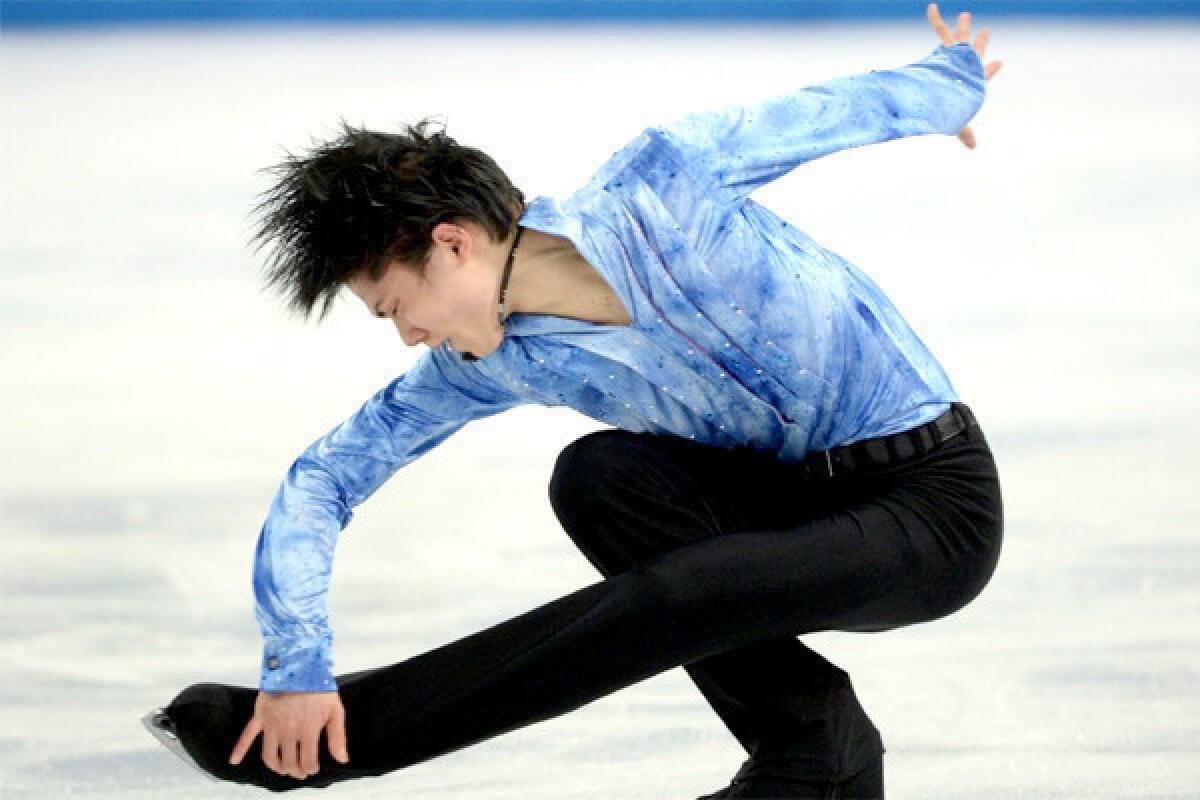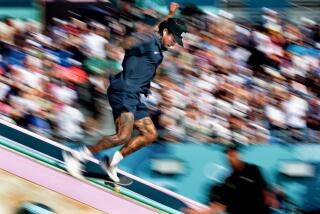Sochi Olympics: Yuzuru Hanyu soars, Evgeny Plushenko drops out

- Share via
SOCHI, Russia — Russia’s Evgeny Plushenko withdrew, and a chunk of the crowd at the Iceberg Skating Palace left with him.
Four-time U.S. champion Jeremy Abbott crashed but burned with a will that drove him to fight off pain, get up and continue.
And there were 19 skaters left in Thursday’s Olympic short program after all of that drama.
FRAMEWORK: Best images from Sochi
One, Japan’s Yuzuru Hanyu, simply brought down the remainder of the house with a barrier-breaking performance so brilliant it will be numbered among the greatest short programs ever, no matter what judging system is used to assess it.
Energetic, powerful, sure-footed on his massive jumps, Hanyu, 19, became the first to pass the century mark, the score of 101.45 topping the 99.84 he earned three months ago. It gave him a lead of nearly four points over favored Patrick Chan of Canada going into Friday’s free skate.
“I really haven’t hit the peak yet,” Hanyu said. “I was performing at 90% of my best.”
With a misstep on the landing of his triple axel jump, Chan had 97.52. More significantly, he had an edge of just .57 over Hanyu in the component marks, where judges often have applied “Chanflation” to his scores.
“I like the chase,” Chan said. “I can enjoy the Olympics during the free skate while Hanyu has a target on his back. At the Olympics, that target is bigger.”
Javier Fernandez of Spain received generous scores and was third at 86.98. Three other skaters — including American Jason Brown, in sixth place with a personal best 86.00 — are less than a point behind Fernandez.
Brown was splendid in his Olympic debut. He showed that only the lack of a quadruple jump, which he has yet to master, keeps him from being an even stronger medal contender.
“In every competition this year, I have gotten a personal best with that program,” he said. “I didn’t want to stop at the Olympics.”
By the end of the night, more than three hours after Plushenko’s pullout, the arena was barely one-third full.
After awkwardly landing a triple axel jump in the warmup just before he was to skate, Plushenko clutched his back as he bent over in obvious discomfort. A couple of minutes later, after consulting with his coach, Alexei Mishin, at the boards, Plushenko went to the referee and dropped out.
Plushenko, 31, has had recurrent back problems for several years. The 2006 Olympic champion and four-time medalist complained of pain in his spine after helping Russia win the team event Sunday night, and it seemed unlikely then that he would do singles.
The team event gold had tied him with Sweden’s Gillis Grafstrom as the only figure skater to win four Olympic medals. Plushenko also won 2002 and 2010 silvers in singles.
“I almost cried out there,” Plushenko said. “I’m sorry for my fans and everybody, but I tried.”
Abbott fell hard on the landing of his opening quadruple jump, slid into the boards and lay on his back, with a hand on his side. After some 15 seconds on the ice, Abbott stood, resumed the 2-minute, 50-second program and finished 15th.
“I was in a big jumble and a lot of pain,” said Abbott, 28, who also fell on the quad during his short program in the team event before the opening ceremony. “When I heard the crowd cheering, I got up and said I had to finish this for them.
“At first, it was like I was in shock. Then the adrenaline kicked in.”
Abbott has said he is retiring from competition after the Olympics. He finished ninth at Vancouver in 2010.
“I think my personal story is about perseverance and getting up when you fall,” he said.
Twitter: @olyphil
More to Read
Go beyond the scoreboard
Get the latest on L.A.'s teams in the daily Sports Report newsletter.
You may occasionally receive promotional content from the Los Angeles Times.






